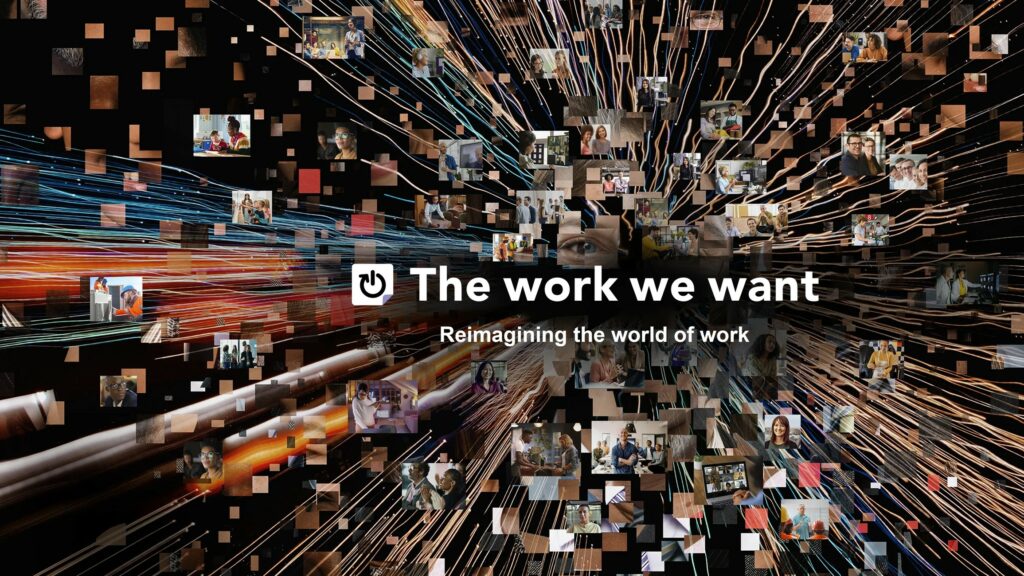杰艾智库丨职场政策为何需要跟上年轻人的步伐
近期,世界就业联合会(WEC)公布了其最新的战略研究项目“The Work We Want”的成果。该项目是WEC携手FT Longitude,以及招聘和雇佣行业的主要商业领袖合作进行的,而我们杰艾控股就是项目组的重要成员之一。该项目成果分为三个篇章,以下是第二篇章的第二篇推文,杰艾控股持续翻译转载,与大家一起分享探讨。

Why Workplace Policy Needs to Catch up With the Young
职场政策为何需要跟上年轻人的步伐
A global shift in workplace demographics is under way. In many leading economies, ageing societies are experiencing a wave of retirement that is contributing to a global talent crunch and leaving employers struggling to replace the missing workforce.
全球职场人口结构正在发生变化。在许多领先的经济体中,老龄化社会正在经历着一场退休潮,这加剧了全球人才短缺,让雇主们疲于填补空缺的劳动力。
But the other consequence of this shift is equally important: younger generations will represent a larger share of our workers. In 2024 Gen Z (anyone born between 1997 and 2012) is set to overtake the Baby Boomers generation in the full-time workforce, and Millennials will be the dominant generation in work for many years to come.
这种转变的另一个后果同样重要:年轻一代将在就职人员中占更大比例。2024年,Z世代(1997年至2012年出生人士)将在全职劳动力中超过婴儿潮一代;而千禧一代将在不久的未来成为工作中的主导一代。
Younger generations, then, are the future of the workforce. As such, employers are striving to understand their priorities and meet their expectations. But are politicians equally attentive to this important demographic?
年轻一代是劳动力的未来。因此,雇主们正在努力了解他们的优先事项并满足其期望。但政客们是否同样关注这一重要人口群体呢?
“There is a clear juxtaposition of the younger workers entering employment and the older workers who are creating the policies,” comments Denis Pennel, managing director of the World Employment Confederation (WEC). “Policymakers may be stuck to a dogma, and making assumptions about what workers want, based on their own experiences.”
“职场中的年轻人和制定政策的年长者明显并存。”世界就业联合会(WEC)总经理Denis Pennel评论道,“政策制定者可能会固守教条,根据自己的经验对员工的需求做出假设。”

The gap between lawmakers and younger workers
立法者和年轻职场人之间的代沟
In many countries around the world, there is a representation gap between politicians and younger workers. Globally, researchers found, young people aged 18 to 35 are significantly under-represented in legislatures: the proportion of younger people in the general population is three times smaller than the proportion of legislators representing that group.
在世界上许多国家,政治家和年轻的职场人之间存在代表性差距。研究人员发现,在全球范围内,18至35岁的年轻人在立法机构中的代表性明显不足:年轻人在普通人口中的比例是代表该群体的立法者比例的三倍。
The average member of the US House of Representatives was about 20 years older than the average US citizen during the 2020-22 legislative term. A similar lack of representation was found in counties such as Japan and India. In Europe, the average age of Members of the European Parliament is 53, compared with a median age across the EU’s population of 44.5 years in January 2023.
在2020-22年立法任期内,美国众议院议员的平均年龄比美国公民的平均年龄大20岁左右。在日本和印度等国也发现了类似的缺乏代表性的情况。在欧洲,欧洲议会议员的平均年龄为53岁,而2023年1月欧盟人口的中位数年龄为44.5岁。
Such an age disparity may lead to legislators underestimating the change in mindset of many members of the workforce.
这种年龄差距可能会导致立法者低估许多劳动力心态的变化。
For example, new global research from WEC, which surveyed 715 senior business executives, finds that 83% of respondents say that, since the pandemic, workers place as much value on flexibility in terms of when and where they work as on compensation. That data relates to all workers, but there is substantial evidence to suggest that younger people are particularly keen to secure flexibility in their working lives.
例如,WEC一项最新全球研究调查了715名高级企业高管发现,83%的受访者表示,自疫情以来,员工认为工作时间和地点的灵活性与薪酬一样重要。这些数据涉及所有职场人员,但有大量证据表明,年轻人更热衷于确保工作生活的灵活性。

A 2022 LinkedIn survey found that Gen Z workers were the cohort most likely to have left a role owing to a perceived lack of flexibility (72% fell into this category, compared with 69% of Millennials; 53% of Gen X; and 59% of Boomers). As a US report by McKinsey found, the desire for flexibility is also part of the reason why 18‒24‒year‒olds are more likely than other age groups to work multiple jobs: 25% do so compared with 16% across all other age groups.
领英2022年的一项调查发现,Z世代员工是最有可能因缺乏灵活性而离职的群体(Z世代占比72%,而千禧一代、X世代和婴儿潮一代的这一比例分别为69%、53%和59%)。正如麦肯锡在美国的一份报告中发现的那样,对灵活性的渴望也是18-24岁的人员群体比其他年龄组更有可能从事多种工作的原因之一:其中25%的人从事多种工作,而所有其他年龄组的这一比例为16%。
Yet the policy discussion often sets up a dichotomy between permanent full-time roles and flexible contract working in a way that seems to ignore the priorities of younger people. While McKinsey found that most young people with multiple jobs hoped ultimately to find permanent roles, they also discovered that a substantial proportion chose to take multiple roles because they enjoy the variety of work (28%) or because of the autonomy and flexibility such an arrangement offers (24%).
然而,政策的讨论往往在长期全职工作和弹性合同工作之间建立了二分法,这在某种程度上似乎忽视了年轻人的优先事项。麦肯锡发现,大多数拥有多份工作的年轻人希望最终能找到固定的工作;但同时也发现,很大一部分人选择担任多份工作是因为他们喜欢做各种各样的工作(28%),或者因为这种安排提供的自主权和灵活性(24%)。
Similarly, research by Deloitte found that, while money was the primary driver for Gen Z and Millennials taking on second jobs, substantial numbers also did so for other reasons, including to monetise a hobby or pastime; to provide them with a change in focus; and to expand their networks. The problem in much political debate is that the conversation effectively excludes and dismisses the preferences of those young people who want varied work and value flexibility.
同样,德勤的研究发现,虽然金钱是Z世代和千禧一代从事第二份工作的主要驱动力,但也有相当多的人是出于其他原因,包括将爱好或消遣货币化、关注点变化、以及拓宽人脉等。存在于许多政治辩论中的问题是,这种对话实际上排除并否定了那些想要多样化工作和重视灵活性的年轻人的偏好。
WEC’s new research suggests that employers are developing a more balanced approach. Executives say their organisations offer a range of benefits to both permanent and agency workers: 59% say they offer training opportunities to agency workers, for example, while 46% offer job-rotation opportunities. Such considerations can help meet young people’s appetite for self-development. Our recommendations include a call to create more rewarding and diverse experiences for workers on all types of contracts.
WEC的新研究表明,雇主们正在试图制定一种更为平衡的方法。高管们表示,他们的组织为长期员工和中介员工提供了一系列福利:例如,59%的高管表示,他们为中介员工提供培训机会,46%的高管提供轮岗机会。这些想法有助于满足年轻人自我发展的欲望。我们的建议就包括呼吁为所有类型合同的员工创造更多有价值和多样化的体验。

Supporting mental health
支持心理健康
Policymakers also need to heed the particular challenges facing younger generations of workers. For example, there is evidence of high levels of anxiety and mental health issues among younger workers, with a recent study finding that, in the preceding six months, more than half of 16‒24‒year‒olds had taken time off work owing to mental health problems. Some of these difficulties may be attributed to the lingering effects of the Covid-19 pandemic, but modern working practices can also have a negative impact.
政策制定者还需要注意年轻职场人面临的特殊挑战。例如,有证据表明,年轻员工存在高度焦虑和心理健康问题。最近的一项研究发现,在过去的六个月里,超过一半的16-24岁员工因心理健康问题而请假。其中一些困难可能归因于新冠肺炎大流行的持续影响,但现代的日常工作也可能产生负面影响。
“There’s evidence that remote working leads to a blurring [of the line] between work life and private life,” points out Stijn Broecke, senior economist at the OECD. When everyone can read emails or instant messages on their phone, employees can be made to feel that they should be available and responsive outside of working hours. This harms their ability to switch off and recharge.
经合组织高级经济学家Stijn Broecke指出:“有证据表明,远程工作会导致工作生活和私人生活之间的界限模糊。”当每个人都能在手机上阅读电子邮件或即时消息时,员工会觉得他们应该在工作时间之外随时待命并做出回应。这会损害他们下班修整和自我恢复的能力。
A number of European countries have followed France’s lead in introducing rules about workers’ right to disconnect, as have countries such as Argentina and Chile. “This is where policymakers need to be looking: legislation around the right to disconnect,” says Broecke.
许多欧洲国家正试图效仿法国,出台了有关工人下班断开与工作联系的规定,阿根廷和智利等国也是如此。“这正是政策制定者需要关注的地方:围绕断开联系的权利进行立法,”Broecke说。
Another way for organisations to support their employees’ mental health is through career support. Ensuring that career pathways are visible, and building development programs, can help individuals feel in control of their careers and increase their sense of empowerment. This in turn reduces frustration and anxiety, and builds happiness.
组织支持员工心理健康的另一种方式是职业生涯支持。确保员工职业道路清晰可见,并制定发展计划,可以帮助员工个人掌控自己的职业生涯,增强他们的赋权感。这反过来又减少了沮丧和焦虑,建立了幸福感。

Agile lawmaking for the changing world of work
为不断变化的工作世界制定灵活的立法
Ultimately, the current crop of lawmakers can’t change the representation gap; that may come through systemic change in the future. What they can do is reflect on the fact that, collectively, lawmakers govern the workplace experiences of the young. With more young people seeking to start flexible contracts that suit their life priorities, the challenge for policymakers is recognising and supporting younger workers in finding the sort of work they want.
最终来看,目前的这批立法者无法改变代表性差距,但是这完全可能通过未来的系统性变革来实现。他们所能做的是反思这样一个事实,即立法者集体管理着年轻人的工作体验。随着越来越多的年轻人寻求签订适合他们生活优先事项的灵活合同,政策制定者们面临的挑战是认可并支持年轻工人找到他们想要的工作。
Employers are waking up to the mindset changes of the young people they are trying to attract, but they are still bound to operate by legal frameworks that sometimes feel ill-designed to accommodate the preferences of younger workers. Policymakers around the world could do more to meet those needs, and bring forward rules that support the development of more flexible job markets. This could help younger workers to find the diverse and rewarding opportunities that they seek.
雇主们正在意识到,他们试图吸引的年轻人的心态发生了变化,但他们仍然必须遵守法律框架,即使部分法律框架有时会让人觉得不适合年轻职场人的喜好。世界各地的政策制定者可以采取更多措施来满足这些需求,并提出支持发展更灵活的就业市场规则。这可以帮助年轻员工找到他们所寻求的多样化和有回报的机会。
“The Work Life We Want” is the final chapter of this project, which will explore how that multi-pronged approach can help provide the work life we want and what regulatory changes are needed to make it happen. Stay tuned for our next sharing.
“我们想要的工作生活”是这个研究项目的最后一个篇章,重点探讨多管齐下的方法将如何有助于提供我们想要的工作生活,以及实现这一目标需要什么样的监管变革。我们下一篇章见!



